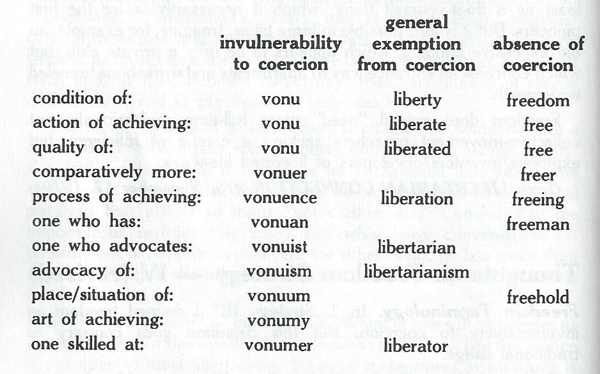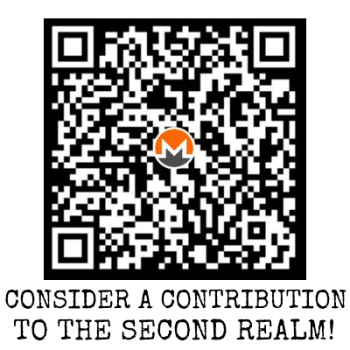Below, you will find a list of commonly used terms we will use and their definitions. This will be updated periodically.

Vonu: the condition or quality of, as well as the action of achieving, an invulnerability to coercion.
Vonuer: having comparatively more an invulnerability to coercion.
Vonuence: in the process of achieving an invulnerability to coercion.
Vonuan: one who has an invulnerability to coercion.
Vonuist: one who advocates for an invulnerability to coercion.
Vonuism: the advocacy of an invulnerability to coercion.
Vonuum: the place or situation of an invulnerability to coercion.
Vonumy: the art of achieving an invulnerability to coercion.
Vonumer: one skilled at an invulnerability to coercion.
Political Crusading:
a strategy to restore liberty by working inside of the system in order to change it from within. Examples of this are petitioning, writing to congressmen, protesting, grassroots lobbying, running for public office, and voting. Synonyms include reformism and bullshit libertarianism.
Security Culture:
the direct application of the right to privacy. As a strategy to maintain liberty, it is focused on the how of making privacy happen in the real world, given that the philosophical justification for privacy is self-evident, particularly through argumentation ethics.
Lawfare:
the use of the government’s monopoly laws as a weapon of war against its own citizenry. As a form of tyranny, it seeks to enslave humans through befuddlement of its legalese (confusion & fear in nearly equal measures). Often a more genteel version of democide, but also has been known to justify it, as well (“the king can do no wrong”)
Democide:
murder by government of its own citizenry.
Extraconstitutionality:
a quality of judicial interpretation whereby the spirit of constitutional law is violated, but the black letter law of constitutionality is technically obeyed. It does this by exploiting loopholes and lacunae within constitutions through the use of legislative statutes and bureaucratic regulations. Often, the constitutional avoidance doctrine is used to deflect public attention from legal abuse(?).
Administrative Agencies:
independent government bureaucracies, described by U.S. Senator Patrick McCarran as the fourth branch of government. As a government within a government, they centralize all the powers of the three constitutionally enumerated branches unto themselves; for example, rule-making is a legislative function. They operate as elements of both the federal and several state governments.
Bluecoats:
government police, in recognition of their historical predecessors, the British Redcoats. Their role is to enforce the dictates of those who falsely imagine themselves to be our rulers, not to serve out the demands of natural justice. Synonyms include police extortionists, road pirates, tin badge gods, armed bureaucrats, Gestapo thugs, Stasi creeps, the King’s guards, bludgies (the bludg), and many more! In short, they are thoroughly un-American (even anti-American).
Argumentation Ethics:
a logical proof that demonstrates the performative contradictions within all political arguments except those justifying private property. It upholds the validity of the non-aggression principle and the self-ownership axiom by showing that individuals who argue with each other have not only foresworn coercion (that is, the initiation of the use of force), but have also affirmed property rights in the moment, simply due to their own exercise of such rights within the very act of arguing itself. Fundamentally as a concept, it insists upon integrity by steadfastly opposing hypocrisy.
Agorism:
a libertarian strategy that seeks to abolish the State through grey and black-market activities, thereby developing the capabilities of the agora (an unlicensed, unregulated, untaxed, laissez-faire freed market).
Second Realm:
an updated version of Temporary Autonomous Zones (TAZ). Essentially, the ability to conduct trade and other activities (including vices) in certain areas at particular times without reprisal from the State. TAZ were originally conceived of as geographically mobile, like vonu shelters, yet now it may include cyperspace, such as the deep web.
Free Isles/Freeports:
synonyms for Permanent Autonomous Zones (PAZ). Often, these are considered in mainstream language to be known as free economic zones or special economic zones, whereby taxes and regulations are either truly minimal or nonexistent, largely due to contractural terms negotiated with a hosting nation-state government. Modern examples include Hong Kong & Crimea. In the future, PAZ may very well take the form of seasteading colonies, outer space colonies, or quite possibly, individually reclaimed “public” lands converted into private use through homesteading.
Satyagraha:
a strategy of exerting “truth force” against one’s opponents. Known more colloquially as “falling on your sword.”
Controlled Schizophrenia:
the mental state of an opportunistic citizen-serf within the servile society who practices doublethink, yet who still acts in his own best interest. Political crusaders are but just one example of this in action.
Collective-Movementism:
an aggregate set of behaviors and actions that are aimed towards large-scale socio-political change in the furtherance of specific goals. Examples include the environmentalist movement, the alt-right, the labor movement, the libertarian movement, the public lands movement, the anti-war movement, the gay rights movement, the womens’ rights movement, and the civil rights movement.
[The] Servile Society:
a society that does not respect self-ownership or individual liberty, but rather heralds the supremacy of government and authority; in other words, it upholds the collective as superior to the individual. A one-directional isolation of import-export is used to maintain access to the servile society’s open-but-not-free trading centers yet denying them access to a vonuan’s home through importing goods and knowledge while exporting labor or products back out to the servile society.
Legal Interstices:
grey areas within the law that can be used to violate the spirit of the law while simultaneously keeping the letter of the law.
Mean Time to Harassment (MTH):
the strength of vonu, usually expressed in years. MTH is typically used to gauge the profitable viability of concealing a vonuum relative to one’s competency at vonumy.
Non-Aggression Principle (NAP):
a moral axiom that absolutely forbids all coercion and initiatory force; such an ethic upholds the principle of self-ownership. The NAP is argumentatively justified through argumentation ethics.
Self-Ownership:
a moral axiom that justifies the existence of the free market by upholding individual property rights. Self-ownership is argumentatively justified through argumentation ethics.

